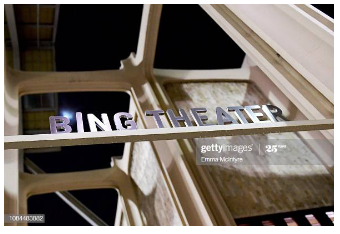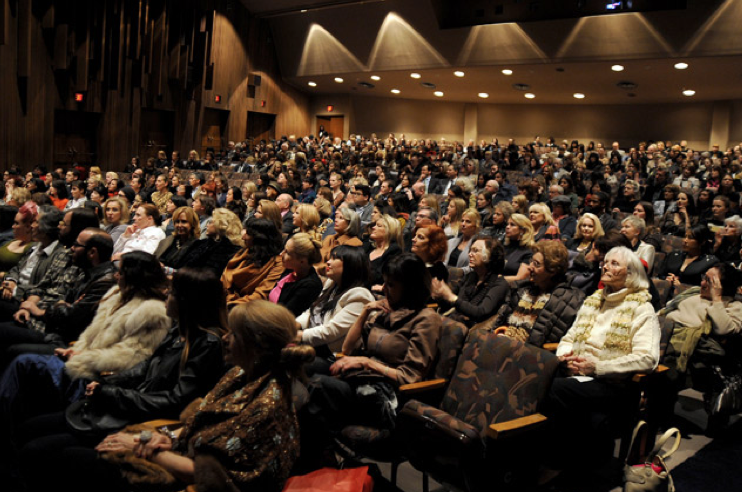CommentsPERSPECTIVE--The demolition of the Los Angeles County Museum of Art - LACMA - has started, and one of the first casualties to disappear from the cultural history of Los Angeles is the Bing Theater.
This was a 600-seat multipurpose theater used for films, lectures, and classical music concerts. The entrance lobby was a square with a high ceiling, lined in dark wood, ribbed paneling, with a large, mid-century design chandelier. I always slowed my steps when I entered.
There were two exit doors, one straight ahead to the cafeteria, the other to the theater lobby. There was also an elevator and stairs to the lower floor restrooms and museum offices. The lower level hallway was lined with changing exhibitions of painting and prints, away from the greater exposure of the main galleries, but always a richly rewarding experience when one took the time to look.
But it was that double door to the right after entering the main lobby which took one to the inner theater lobby to the Bing Theater for a lecture, the screening of a film, and for me particularly, a concert classical music. With the destruction of the Bing Theater the cinematic, and particularly the classical music history of Los Angeles has taken devastating and very sad blows.
The theater lounge also had the dark wood, ribbed paneling, and hung on it were large framed, black and white posters from films spanning what I remember from 1930-40s. These spoke of the history of movies which are so integral to the cultural history of this place. The back wall was floor to ceiling windows bringing the outside inside as part of mid-century design.
The theater itself was wide and deep. It was an always welcoming space which offered a sense of security while pursing something new, or old but forgotten; something familiar or something on the cutting edge.
I did not see many movies at the Bing, but I always made it a point to attend a screening the “The Third Man,” directed by Carol Reed, the scrip was by Graham Greene, with Orson Wells, Joseph Cotton, Alida Valli (An early cinematic crush.), and Trevor Howard. This was the faded print with bad sound before the wonderful remastering, and before its release on DVD. A Pre-DVD its screening was always an occasion. The zither music of Anton Karas carried us through the movie and remained in our ears long after leaving the theater.
The last movie I saw at the Bing was Rainer Werner Fassbinder’s prescient “World on a Wire,” (1973) about our current life lived through computers, texts and the internet.
But what pulled me to the Bing Theater night after night, month after month, year after year were the concerts presented by the museum, curated by the late Dorrance Stalvey whom I will always remember as a friend, mentor, a man of grace and a gentleman. He, along with his wife Valerie Bernstein, were unfailingly cordial hosts for their concerts. Their concerts shrunk the vastness of Los Angeles into a familiar, and indeed familial space.
Stalvey curated two popular and busy concert series: a Wednesday evening dedicated to the more familiar works of classical music. Most Wednesday evening concerts were chamber works to accommodate the stage, but occasionally a small orchestra was presented.
 Of the most memorable Wednesday evenings: Two pianists, each playing alternately the Preludes, Book I of J.S. Bach followed in the same key the Preludes of Frédéric Chopin. One by one the twenty-four preludes, forty-eight in total, were played. There was the Angelus String Quartet transversing a large number of Joseph Haydn’s string quartets, whose quartets are too neglected today. Then there was the forever memorable, magical evening of the Penderecki String Quartet with local clarinetist Gary Gray performing the Clarinet Quintets of W.A. Mozart and Johannes Brahms.
Of the most memorable Wednesday evenings: Two pianists, each playing alternately the Preludes, Book I of J.S. Bach followed in the same key the Preludes of Frédéric Chopin. One by one the twenty-four preludes, forty-eight in total, were played. There was the Angelus String Quartet transversing a large number of Joseph Haydn’s string quartets, whose quartets are too neglected today. Then there was the forever memorable, magical evening of the Penderecki String Quartet with local clarinetist Gary Gray performing the Clarinet Quintets of W.A. Mozart and Johannes Brahms.
These Wednesday evening concerts remain a big part of my musical life, but what first sent me to the Bing Theater were the Monday Evening Concerts, MEC, founded in 1939 on top of a garage in Silver Lake, and is one of the longest running series in the world devoted to contemporary music. Stalvey became the producer of MEC at LACMA in 1971, and retained his position at LACMA until he was unkindly or shortsightedly dismissed by LACMA.
Igor Stravinsky's final composition, his setting “The Owl and the Pussy-cat” was the first English verse to be memorized by his wife Vera. The premiere was at an MEC at LACMA concert, but Stravinsky was too ill to attend, though over the years he did attend MEC concerts at LACMA to keep up to date with music of his time.
Pierre Boulez’s American premiere as a composer and conductor was at an MEC at LACMA concert with his “Le marteau sans maître.” Pianist and teacher Leonard Stein was a constant presence in the audience of MEC concerts. Stein was a protégé of Los Angeles composer Arnold Schoenberg. Both Stravinksy and Schoenberg were contemporaneous residents of Los Angeles.
Leonard Stein’s last performance was an MEC at LACMA concert performing Boulez’s Piano Sonata, No. 2, with Boulez in the audience. Before the concert a number of other composers stood to the side, glancing at Boulez in recognition of his presence.
My first MEC at LACMA concert remains a seminal, and somewhat humorous personal experience. The program was Schoenberg’s “Pierre Lunaire,” and then living composer Peter Maxwell Davies’ “Eight Songs for a Mad King.” The music of Davies was completely new, and foreign to me at that time. I was a bit confused by what I heard in Davies work in the first half of the program. After intermission I returned to my seat, and seated in my seat, and next to him, were two men with rather sheepish looks on their faces. They seemed intent on not being seen. I, a rash young man, told them they were in my seat, and they quietly, and as English Gentleman, moved to other seats. A few years later it came to my embarrassing realization that one of the men was the composer himself, Peter Maxwell Davies, and his companion was the eminent conductor, Sir Simon Rattle, and I told them to move.
From then on my many attendances at MEC at LACMA concerts were educational experiences, full of personal and musical growth, all through the work of Dorrance Stalvey’s firm hand as curator of MEC at LACMA. Indeed, the MEC at LACMA concerts were known throughout the United States and Europe.
Among the performers whom the music community of Los Angeles heard at the MEC at LACMA heard at the Bing Theater were the Pendercki Quartet performing modern works-with the quartets of Bela Bartók of great memory.
Pianist Marino Formenti concerts were events of him exploding the piano with his brilliant performances. Marino was giving two programs back to back within a few days at LACMA. After his premiere concert, past 10:00PM, he was looking for a piano to practice his upcoming concert.
There were the wonderfully eccentric concerts of local new music ensembles: the California E.A.R. Unit, and X-Tet, both ensembles unafraid the explore the newest in music. There was the brilliance of the Arditti Quartet. The always popular Kronos Quartet concerts performed at the Bing Theater. I think over the years at MEC concerts at the Bing Theater I heard every Sequenza by Luciano Berio.
Dorrance Stalvey always presented the newest music in the highest aspirations when producing these concerts. Over the years we in the audience, and indeed all of Los Angeles, were the benefactors of an incredibly rich history of music, known throughout the world.
The LACMA Campus will be reduced to rubble, and in that rubble disappears a vital part of the musical history of classical music in Los Angeles. The new structure is being compared to a large Motel Six. There will be less exhibition space for LACMA’s extensive holdings. Will there even be a replacement theater?
The Bing Theater is now gone. Farewell. I will miss you.
(Matthew Hetz is a Los Angeles native. He is a transit rider and advocate, a composer, music instructor, and former member and president and executive director of the Culver City Symphony Orchestra. He is a CityWatch contributor.)
-cw
















